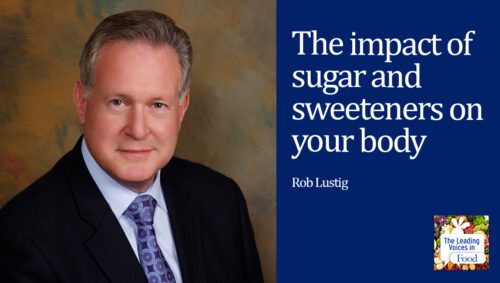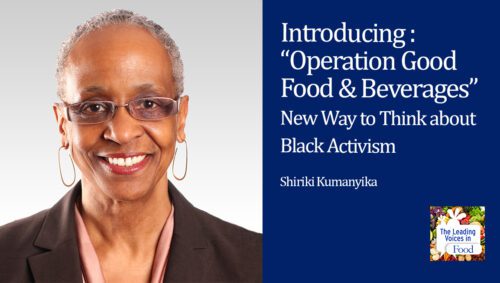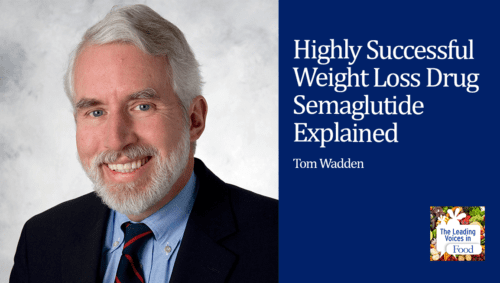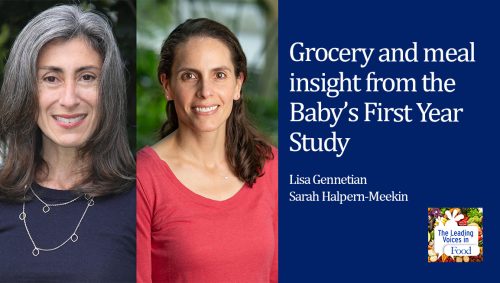The Leading Voices in Food
E74: How Eating Mindfully Can Change Your World
Do you eat mindfully? Could an approach to eating derived from one religious tradition be helpful to us all? Today’s guest, Dr. Lilian Cheung is an expert on just these questions.
Subscribe: Apple Podcasts | TuneIN | Google Podcasts | SoundCloud | PocketCasts | Radio Public
Tags: Addiction & Food | Diet & Nutrition |

Dr. Lilian Cheung at the Harvard School of Public Health, one of the leading nutrition institutions in the country, is the editorial director of The Nutrition Source, the school’s nutrition website for health professionals, media and consumers. She is also a leader with the Asian Diabetes Prevention Initiative, a website for policymakers and the public with the goal of reversing the spread of type II diabetes in Asia. Pertinent to today’s discussion, Lilian is also the author of a book with a leading spiritual figure entitled, Savor: Mindful Eating, Mindful Life, that has now been published in 17 languages.
Interview Transcript
Lilian, I’m so pleased to have you join us. As you know, we’ve recorded a number of podcasts around issues of food and faith. Now I know you come at this from an interesting angle, a background in public health. How did you get interested in spiritual approaches through improving public health?
I grew up in a very spiritual family. My grandmother was a devout Buddhist, so we practice Buddhism at home. I attended a Christian Protestant school from grades one to 10, then I enrolled in a convent in Canada for grade 11 and had to go to mass every week. What I learned is that there is very common themes in all these religions: to be a good person, to take care of oneself as well as others, we are not alone, we need to do good, and serve humanity.
That’s interesting that this was part of your life from a very early age and if we could talk about your book, Savor, I know you collaborated, as I mentioned before, for the prominent spiritual leader. Would you tell us about your coauthor and why his interest in food related issues?
Certainly. My co-author, Thich Nhat Hanh is a world revered Zen Buddhist master. He was nominated by Dr. Martin Luther King Jr. for the Nobel Peace Prize because of his tireless efforts speaking up everywhere to get people to wake up to stop the Vietnam War. In Buddhism, honoring our food and our planet is a very fundamental and key practice. Thich Nhat Hanh has a quote that I use in our book, “The apple in your hand is the body of the cosmos.”
Eating an apple a day, we all know that it keeps the doctors away. But looking deeply into the apple, we realize that they are so many elements from the universe that are involved. The fertile soil, the clouds, the rain, the sunshine, many people including the truck drivers, the farmers and the storekeepers. And that’s where I learned about all these things, the interconnectedness of the food into our society and the planet.
Lillian, here’s this great spiritual figure and how did you come about interacting with him? And where did the idea of a book come about? And then how did the book take place?
I actually went to a retreat in 1997 in Key West, Florida. I had no idea about what it’s like, over 1,000 people, retreatants under one big tent. And I found out there are many psychotherapists, psychologists, physicians, educators, and even lawyers in the retreat. And there for the whole week long we just learned three things, mindful breathing, mindful walking and mindful eating. And I said, “My gosh, what’s mindful eating?” I didn’t learn that from school and all through my education.
Thich Nhat Hanh’s teaching really opened me up to a different dimension of food. He also share with us a parable from the Buddha. It’s called The Sutra on the Son’s Flesh.
A young couple and their three year old son had to cross a vast desert and move to another country where they wanted to seek asylum. They were not familiar with the terrain nor did they know how long the journey would take and they ran out of food while they were only halfway through the desert. They realized that without enough food, all three of them would die in the desert with no hope of reaching the country on the other side of the desert. After agonizing reflection, the husband and wife made the decision to kill the little son for food. Each day they ate a small morsel of his flesh in order to have enough energy to move on. And they carried the rest of their son’s flesh on their shoulders so that it could continue to dry in the sun. Each time when they finish eating a morsel of their son’s flesh, the couple looked at each other and asked, “Where is our beloved child now?”
Having told this tragic story, the Buddha looked at the monks and asked, “Do you think that this couple was happy to eat their son’s flesh?” “No, world honored one. The couple suffered when they had to eat their son’s flesh,” the monks answered. The Buddha taught the following lesson, “Dear friends, we have to practice eating in such a way that we can maintain compassion in our hearts. We have to eat in mindfulness. If not, we may be eating the flesh of our own children.”
I think this parable has a lot of parallel and significance for the 21st century. As we know, with the way we are eating now, it’s a real big drain on our planet and the EAT-Lancet report already report it. If we don’t change the way we eat and eat a much more plant-based diet, we will not have enough food for our children, grandchildren, and grand-grandchildren.
That story is unimaginable and just evokes so much imagery and so much emotion, but it does really tell a very interesting story. Let’s link that to your book, Savor. Now your book makes a very unique and I think quite important contribution. Can you explain the philosophy that’s the foundation of the book? And then after that we can come back and talk about what you mean by mindful eating.
The book fundamental principle is about mindfulness and what is mindfulness. Thich Nhat Hanh defines mindfulness as the practice of being fully present and alive, body and mind united. And mindfulness is the energy that helps us to know what is going on in the present moment. Mindfulness is about maintaining a moment by moment awareness of our thoughts, feelings, bodily sensations and surrounding environment. Mindfulness also involves acceptance, meaning that we pay attention to our thoughts and feelings without judging them. Without believing, for example, that there is a right or wrong way to think or feel in a given moment. This, Thich Nhat Hanh describes as an equanimity. A very important concept in the practice. When we practice mindfulness, our thoughts tune into what we are sensing in the present moment rather than rehashing the past or imagining the future. And mindfulness helps us bring awareness to the present moment without judgment.
We multitask a lot nowadays in the digital age, which is becoming more stressed and harried. There seems to be not enough time just to eat for eating sake. People eat in front of the computer for lunch, scanning of our smartphones. In dinner time, we eat in front of the TV. We have the magazine or newspaper and we eat while we are driving. So my recommendations for mindful eating as follows. Honor the food by practicing this, when you eat, only eat. No cellphone, no talking, no screening, no reading of documents, magazines or newspapers and try to eat in complete silence. That is not talking to others for the entire meal. I know it’s very difficult, but try it maybe once a while, say once a week. This is what we did in the retreat and it’s extremely different. It’s very nourishing and you notice an awful lot about the food and how satisfying it is.
So the second principle is to engage all your senses. Not only just the taste, but just the smell of the food, the texture, the sound in terms of crunchiness, the sight of the foods and the thought of the food. Then third, is just serve in modest portions to enjoy quality and not quantity, which is unfortunately the American portion of food is way too big and we can definitely reduce it and maybe cut it into half for restaurant meals.
The next principle is to chew thoroughly, savoring small bites. And this would help out digestion and the ability to taste the food better. Then we also eat slowly to avoid overeating and allow yourself to feel satiated because it does take about 20 minutes before the brain gets the signal from the stomach that we are full.
Another principle is not to skip meals so that you do not get ultra-hungry and eat a lot more.
And last but not least, eat a plant-based diet for our own health and the health of the planet. There is a lot of research about the merits of a plant-based diet for our own health now.
It makes perfect sense. When you mentioned eating in silence, even if you’re with other people, I thought, oh my God, how uncomfortable could you make people? Just be around people and you’re so used to talking. How could you sit there and not talk? What was it like as you started doing this? And as you recommend this to people, what kind of experiences do they have?
In the beginning it’s very uncomfortable. I remember from the retreat that people in the beginning, just even want to reach out and signal and do lots of writing and stuff on paper. But they are very good in leading us so before we eat they have a five contemplation saying. They read out some verses to honor the food and it can be also found in our Savor website, savorthebook.com. And once you go through those verses, your awareness is raised and yes at home, especially with a family, with children for example, it would be impossible to have a whole meal in silence. However, it is possible to just say for the first two or three minutes of our dinner together, we’re not going to talk. We just focus on our food, what is on our plate and the first few bites, how it feels.
Then the rest of the dinner we can talk because it’s precious time for our family members to get together to relate. And I think it can be done. As a matter of fact, in work sites, in Google for example, they regularly conduct mindful lunches and so people get together and go through a completely silent meal with readings and very special cuisine that are from the local farms and so forth. And we also started a mindful eating corner in the School of Public Health at Harvard. And what we do is ask people to put their cellphones in the center as they sit down so they’re not going to be connected to any digital stuff and eat silently in the first few minutes.
Is there research showing whether this approach is helpful?
Oh yes. There is more and more research showing that mindful eating is helpful in terms of treating various conditions that we nutritionists are concerned with. As a matter of fact, in the 2014 publication in Obesity Reviews, 18 out of the 21 studies reported positive changes in eating behavior outcomes. Eleven out of the 12 studies reported improvements in binge eating frequency and severity. And five out of the eight studies reported improvements in emotional eating behavior. And four out of six studies reported improvements in external cues eating behavior. And as a matter of fact, we post in savorthebook.com, weekly scientific studies related to mindfulness and mindful eating as well as inspirational messages to help practice mindfulness on.
It’s certainly impressive how your book has been translated into so many languages so you’ve hit a resonant chord to be sure. And it’s nice to know that there is research supporting the impact of this kind of an approach. What do you see as the future of this work? Where do you think things will go?
Well, we published in 2016 an article in the journal of the Academy of Nutrition and Dietetics, about the need to have an expanded model for mindful eating for health promotion and sustainability. I think there will be more research on how mindful eating can positively impact our health and the health of the planet. Again, the 2019 EAT-Lancet report on food sustainability is a very important document reminding us how we should go about it and the importance of eating for the health of our planet and eating a more plant-based diet. I think the future in terms of mindful eating will go beyond the personal behavior of weight management and eating disorder management. There are also studies that have looked at how mindful eating can positively affect the control of diabetes and so forth. Summarizing it all, our sympathetic nervous system is in overdrive. And by just practicing simple mindfulness skills through mindful eating, mindful walking and mindful breathing, we can develop a deeper sense of calm and compassion that can help us handle challenges and difficult moments, calmness.
You’ve merged together so many interesting things, public health, nutrition, the environment and spirituality, and it’s comes together into this amazing model of mindful eating. It’s really nice of you to share this with us. I’m very grateful for you coming together with us on the show today.






